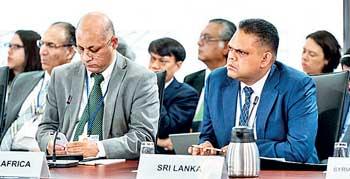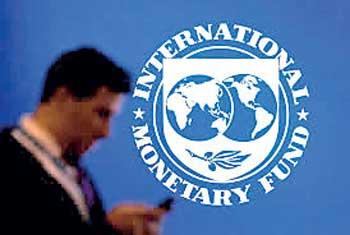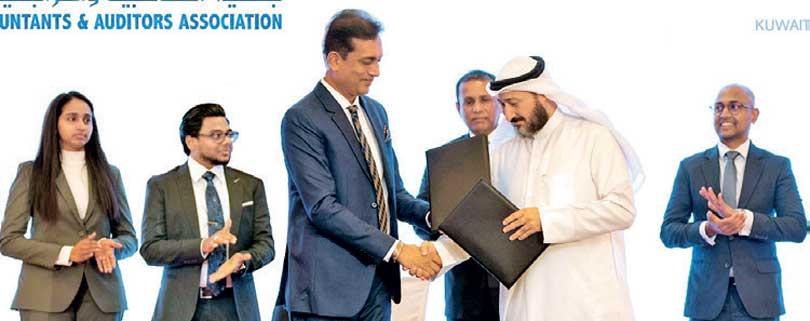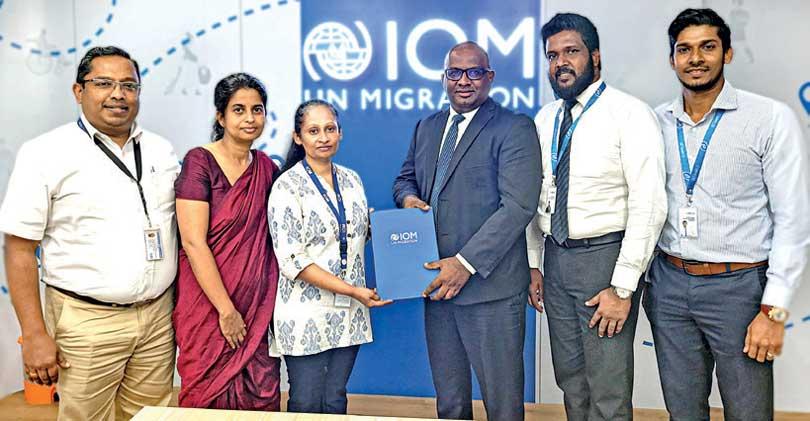 The mounting tensions in the Middle East that are becoming increasingly unpredictable are likely to impact the Ceylon Tea cuppa, the industry stakeholders said, especially since over 50 percent of the island nation’s tea is exported to that region.
The mounting tensions in the Middle East that are becoming increasingly unpredictable are likely to impact the Ceylon Tea cuppa, the industry stakeholders said, especially since over 50 percent of the island nation’s tea is exported to that region.
While the issues stemming from the Red Sea attack have already impacted the industry with longer delivery time and higher freight costs, new issues such as closure of airspace among others could add to the woes.
“Continuity of this would mean restricted movement of people, sending out samples and getting orders. As long as the sea is open, things should be okay.
But our worry and deep concern are going forward what will happen to the sea routes. This can drastically affect the prices and the local livelihoods of people who depend on tea,” Tea Exporters Association Chairmen Ganesh Deivanayagam told Mirror Business.
He stressed that the worsening situation in the Gulf can immediately put a strain on the tea prices.
“Any further issue can put our small industry at a major risk,” said Deivanayagam.
Reflecting similar sentiments, tea veteran and Tea Traders Association Past Chairman Jayantha Karunaratne affirmed that the industry is deeply concerned regarding the tensions in the Middle East.
“Whatever happens in the Middle East is affecting us. As exporters, we are doing standard type of businesses and it will and is impacting us. Most of the impacts are indirect,” he said, pointing out the industry is also beginning to worry about the possible trade sanctions.
Meanwhile, Sri Lanka Tea Board Chairman Niraj de Mel noted that such situations the local industry has experienced before and no major concerns have been raised with the authorities as yet.
“So far, we haven’t had any adverse reports come from the tea exporters as yet. None have complained about shipment disruption. Even when the Houti attacks took place no concerns were raised,” he said.
 ]]>
]]> The mounting tensions in the Middle East that are becoming increasingly unpredictable are likely to impact the Ceylon Tea cuppa, the industry stakeholders said, especially since over 50 percent of the island nation’s tea is exported to that region.
The mounting tensions in the Middle East that are becoming increasingly unpredictable are likely to impact the Ceylon Tea cuppa, the industry stakeholders said, especially since over 50 percent of the island nation’s tea is exported to that region.
While the issues stemming from the Red Sea attack have already impacted the industry with longer delivery time and higher freight costs, new issues such as closure of airspace among others could add to the woes.
“Continuity of this would mean restricted movement of people, sending out samples and getting orders. As long as the sea is open, things should be okay.
But our worry and deep concern are going forward what will happen to the sea routes. This can drastically affect the prices and the local livelihoods of people who depend on tea,” Tea Exporters Association Chairmen Ganesh Deivanayagam told Mirror Business.
He stressed that the worsening situation in the Gulf can immediately put a strain on the tea prices.
“Any further issue can put our small industry at a major risk,” said Deivanayagam.
Reflecting similar sentiments, tea veteran and Tea Traders Association Past Chairman Jayantha Karunaratne affirmed that the industry is deeply concerned regarding the tensions in the Middle East.
“Whatever happens in the Middle East is affecting us. As exporters, we are doing standard type of businesses and it will and is impacting us. Most of the impacts are indirect,” he said, pointing out the industry is also beginning to worry about the possible trade sanctions.
Meanwhile, Sri Lanka Tea Board Chairman Niraj de Mel noted that such situations the local industry has experienced before and no major concerns have been raised with the authorities as yet.
“So far, we haven’t had any adverse reports come from the tea exporters as yet. None have complained about shipment disruption. Even when the Houti attacks took place no concerns were raised,” he said.
 ]]>
]]>
 Sri Lanka crossed the 700,000 tourist arrival milestone within the first 14 weeks of the year, almost half the time frame taken to reach the mark in 2023.
Sri Lanka crossed the 700,000 tourist arrival milestone within the first 14 weeks of the year, almost half the time frame taken to reach the mark in 2023.
The provisional data from the Sri Lanka Tourism Development Authority showed that from January 01 to April 15, the island nation welcomed a total of 718,315 international visitors.
For the first 15 days of April, Sri Lanka saw a total of 82,531 tourists enter the country, which affirms the island nation is maintaining the growth momentum.
The daily arrival average improved to around 5,502 in the month, from below 3000 arrivals a year ago.
Sri Lanka is targeting between 168,539 and 182,724 tourist arrivals for April, which requires a daily average between 5,617 and 6,090, to achieve this target.
The current arrival momentum shows that Sri Lanka may reach the lower bound of the arrival target for the month.
However, the country is on the course to overperform 105,498 arrivals recorded in April last year, if the current arrival trend persists. For the island nation to reach April 2018 tourist arrivals, an improved momentum is required.
India topped the list as the largest tourist traffic generator, accounting for 17 percent of the total arrivals recorded for April so far.
The United Kingdom ranks as the second largest tourist traffic generator, contributing to 11 percent of the tourist arrivals.
With the recent update to travel advisory on Sri Lanka by the UK authorities, Sri Lanka expects a higher number of tourist arrivals from that market.
Russia was the close third, bringing in 10 percent of the total number of international visitors.
Germany, France, Australia and China occupied the fourth, fifth, sixth and seventh positions in the rankings. (NF)
 ]]>
]]> Sri Lanka crossed the 700,000 tourist arrival milestone within the first 14 weeks of the year, almost half the time frame taken to reach the mark in 2023.
Sri Lanka crossed the 700,000 tourist arrival milestone within the first 14 weeks of the year, almost half the time frame taken to reach the mark in 2023.
The provisional data from the Sri Lanka Tourism Development Authority showed that from January 01 to April 15, the island nation welcomed a total of 718,315 international visitors.
For the first 15 days of April, Sri Lanka saw a total of 82,531 tourists enter the country, which affirms the island nation is maintaining the growth momentum.
The daily arrival average improved to around 5,502 in the month, from below 3000 arrivals a year ago.
Sri Lanka is targeting between 168,539 and 182,724 tourist arrivals for April, which requires a daily average between 5,617 and 6,090, to achieve this target.
The current arrival momentum shows that Sri Lanka may reach the lower bound of the arrival target for the month.
However, the country is on the course to overperform 105,498 arrivals recorded in April last year, if the current arrival trend persists. For the island nation to reach April 2018 tourist arrivals, an improved momentum is required.
India topped the list as the largest tourist traffic generator, accounting for 17 percent of the total arrivals recorded for April so far.
The United Kingdom ranks as the second largest tourist traffic generator, contributing to 11 percent of the tourist arrivals.
With the recent update to travel advisory on Sri Lanka by the UK authorities, Sri Lanka expects a higher number of tourist arrivals from that market.
Russia was the close third, bringing in 10 percent of the total number of international visitors.
Germany, France, Australia and China occupied the fourth, fifth, sixth and seventh positions in the rankings. (NF)
 ]]>
]]>
Tea Exporters Association (TEA) Chairman Ganesh Deivanayagam asserted that the industry is becoming less competitive and is at risk.
“Because of this, the industry is already at a fragile situation. The rupee appreciation puts the exporters in a very challenging situation.
It can put the industry further at risk and the survival of the smaller manufacturers and smallholders can be quite challenging,” Deivanayagam said.
This issue is raised not only by the tea industry but also the stakeholders across other sectors.
Earlier this month, along with the TEA, the Exporters Association of Sri Lanka, Joint Apparel Association Forum of Sri Lanka, National Chamber of Exporters and Sri Lanka Association of Manufacturers and Exporters of Rubber Products listed a host of challenges emanating from an overvalued rupee.
When Mirror Business asked Sri Lanka Tea Board Chairman Niraj de Mel on his take in this regard, he asserted that Sri Lanka should be happy the currency is strengthening.
While acknowledging it is an issue when it comes to front-end prices and impacting exports, he quipped stating no one complained when they were earning profits in the year 2022, the economic crisis year.
“They (exporters) cry when things are against them but don’t rejoice for everyone to know they are doing well when they are doing well,” he quipped.
De Mel noted that the exporters should step up efforts in expanding the offering and look at increasing capacity.
Tea Exporters Association (TEA) Chairman Ganesh Deivanayagam asserted that the industry is becoming less competitive and is at risk.
“Because of this, the industry is already at a fragile situation. The rupee appreciation puts the exporters in a very challenging situation.
It can put the industry further at risk and the survival of the smaller manufacturers and smallholders can be quite challenging,” Deivanayagam said.
This issue is raised not only by the tea industry but also the stakeholders across other sectors.
Earlier this month, along with the TEA, the Exporters Association of Sri Lanka, Joint Apparel Association Forum of Sri Lanka, National Chamber of Exporters and Sri Lanka Association of Manufacturers and Exporters of Rubber Products listed a host of challenges emanating from an overvalued rupee.
When Mirror Business asked Sri Lanka Tea Board Chairman Niraj de Mel on his take in this regard, he asserted that Sri Lanka should be happy the currency is strengthening.
While acknowledging it is an issue when it comes to front-end prices and impacting exports, he quipped stating no one complained when they were earning profits in the year 2022, the economic crisis year.
“They (exporters) cry when things are against them but don’t rejoice for everyone to know they are doing well when they are doing well,” he quipped.
De Mel noted that the exporters should step up efforts in expanding the offering and look at increasing capacity.
Contrary to the claims that the current economic recovery could get derailed due to the parties coming short in reaching an agreement on restructuring the commercial debt, the evidence showed that the two parties have come a long way in closing the gaps and it is natural there could be bumps in the road toward reaching consensus.
Sri Lanka concluded its first round of restricted discussions with the so-called ad hoc group of bondholders, comprising 50 percent of the total outstanding International Sovereign Bonds but the parties had failed to come to an agreement on the restructuring terms.
The initial proposal made by the bondholders in the middle of March had proposed to link the new bonds to the gross domestic product (GDP) and to have a 20 percent nominal haircut on them. While it further proposed to issue a bond valued at US $ 1,678 million for the Past Due Interest accumulated during the period of default, the coupon rates applicable on the new bonds proposed range from a high of 7.75 percent to 8.25 percent.
The Sri Lankan government meanwhile presented its version of the proposal to restructure the sovereign bonds, which contained only what they called as the plain vanilla bonds, which are linked to nothing, as they contain fixed cash flows, independent of the macroeconomic developments.
While the government had expressed their reservation for the bond holders’ March proposal, the bond holders have rejected Sri Lanka’s proposal.
Meanwhile, the International Monetary Fund (IMF) in its preliminary assessment on each one’s proposals has concluded that while Sri Lanka’s one was consistent with the IMF-supported programme’s debt sustainability targets, the one put forth by the bond holders was not.Despite the developments, the investors in both the equities market and bond markets have broadly shrugged off the noise surrounding the inability of the parties to reach an agreement.
While the equities snapped two days long losses to add 1.78 percent yesterday to settle the All Share Price Index at 11,830.94, the Treasury bills saw the yields falling for the second consecutive week this week.
As a result, the bond holders came up with an updated version of their proposal on April 03, accommodating some of the key observations. But Sri Lanka has continued to make their reservations regarding the structure of what was referred to as the Macro-Linked Bonds or the GDP-linked bonds.
Meanwhile, the bond holders have also suggested the possible introduction of what is called the ‘Governance-Linked Bonds’, for which Sri Lanka has said it would consider subject to being provided with more details of the proposal.A section of the commentators said they remain optimistic of the next stage of the negotiations to further narrow down the areas of differences.They said unlike some who would want to depict this as a setback and a breakdown of the negotiations, they see this as a necessary disagreement towards the final agreement, as negotiation is a process which parties should have a lot of patience until you want to get to where both parties want to go.
“In fact, it is in their interest for the bond holders to make the process smoother and easier for the Sri Lankan government to restructure debt because it was them who hasn’t received their money back in terms of either coupon payments and capital repayments for two years for the money they have lent to Sri Lanka many years ago,” said one economic analyst.
Contrary to the claims that the current economic recovery could get derailed due to the parties coming short in reaching an agreement on restructuring the commercial debt, the evidence showed that the two parties have come a long way in closing the gaps and it is natural there could be bumps in the road toward reaching consensus.
Sri Lanka concluded its first round of restricted discussions with the so-called ad hoc group of bondholders, comprising 50 percent of the total outstanding International Sovereign Bonds but the parties had failed to come to an agreement on the restructuring terms.
The initial proposal made by the bondholders in the middle of March had proposed to link the new bonds to the gross domestic product (GDP) and to have a 20 percent nominal haircut on them. While it further proposed to issue a bond valued at US $ 1,678 million for the Past Due Interest accumulated during the period of default, the coupon rates applicable on the new bonds proposed range from a high of 7.75 percent to 8.25 percent.
The Sri Lankan government meanwhile presented its version of the proposal to restructure the sovereign bonds, which contained only what they called as the plain vanilla bonds, which are linked to nothing, as they contain fixed cash flows, independent of the macroeconomic developments.
While the government had expressed their reservation for the bond holders’ March proposal, the bond holders have rejected Sri Lanka’s proposal.
Meanwhile, the International Monetary Fund (IMF) in its preliminary assessment on each one’s proposals has concluded that while Sri Lanka’s one was consistent with the IMF-supported programme’s debt sustainability targets, the one put forth by the bond holders was not.Despite the developments, the investors in both the equities market and bond markets have broadly shrugged off the noise surrounding the inability of the parties to reach an agreement.
While the equities snapped two days long losses to add 1.78 percent yesterday to settle the All Share Price Index at 11,830.94, the Treasury bills saw the yields falling for the second consecutive week this week.
As a result, the bond holders came up with an updated version of their proposal on April 03, accommodating some of the key observations. But Sri Lanka has continued to make their reservations regarding the structure of what was referred to as the Macro-Linked Bonds or the GDP-linked bonds.
Meanwhile, the bond holders have also suggested the possible introduction of what is called the ‘Governance-Linked Bonds’, for which Sri Lanka has said it would consider subject to being provided with more details of the proposal.A section of the commentators said they remain optimistic of the next stage of the negotiations to further narrow down the areas of differences.They said unlike some who would want to depict this as a setback and a breakdown of the negotiations, they see this as a necessary disagreement towards the final agreement, as negotiation is a process which parties should have a lot of patience until you want to get to where both parties want to go.
“In fact, it is in their interest for the bond holders to make the process smoother and easier for the Sri Lankan government to restructure debt because it was them who hasn’t received their money back in terms of either coupon payments and capital repayments for two years for the money they have lent to Sri Lanka many years ago,” said one economic analyst.
 After years of grappling with economic challenges on the international stage, Sri Lanka is now showcasing its rapid recovery efforts this year.
After years of grappling with economic challenges on the international stage, Sri Lanka is now showcasing its rapid recovery efforts this year.At the G-24 Finance Ministers and Central Bank Governors’ meeting during the IMF/WB Spring Meetings in Washington, Sri Lanka was able to tell an audience comprising of top delegates that progress has been achieved.
According to Finance State Minister Shehan Semasinghe’s update on social media platform X, the key message communicated at the meeting was that the Sri Lankan economy has now stabilised and the growth momentum has commenced.
However, Sri Lanka has expressed that it is looking for support as the economy has more to achieve in its recovery efforts.
“We seek the continued support of our multilateral and bilateral partners for us to meet the formidable challenges successfully and we must come together to share insights, strategies and best practices to navigate these turbulent times and build a more resilient and sustainable future,” he said.
At the deliberations, Sri Lanka highlighted the “deep and wide-ranging” economic reform programme adopted to address fundamental macroeconomic vulnerabilities that contributed to the economic crisis, including significant fiscal reforms, monetary policy adjustment, financial sector stabilisation, debt restructuring, welfare reforms and governance reforms along with progress on the debt restructuring process.
Semasinghe noted that whilst the measures to stabilise the economy have been successful, it was communicated that the government is now in the process of shifting the economy to a new growth path, which is led by non-debt creating inflows, including exports of goods, exports of services and foreign direct investment.
Sri Lanka also took part at the Bio-Diversity Financing Forum held at the world Bank, where the island nation stressed on its priorities and the way forward in accordance to the Climate Prosperity Plan (CPP) launched at the COP 27.
The CPP is a roadmap to attract foreign investment for boosting economic growth and employment generation of Sri Lanka, while accelerating climate adaptation and bringing down the country’s greenhouse gas emissions as it transitions towards net negative emissions.
At the forum, Semasinghe highlighted that Sri Lanka has also set a target for increasing the country’s renewable energy generation from 35 percent to 70 percent by 2030 and that the transport, forestry, water and tourism sectors have similarly ambitious aims.
“Therefore, the country’s plan provides a pathway for Sri Lanka to become a carbon negative economy before the mid of this century. Further noted that Sri Lanka has already initiated work on drafting a Marine Spatial Plan for which the work is already under way,” he said in his update.
 ]]>
]]> After years of grappling with economic challenges on the international stage, Sri Lanka is now showcasing its rapid recovery efforts this year.
After years of grappling with economic challenges on the international stage, Sri Lanka is now showcasing its rapid recovery efforts this year.At the G-24 Finance Ministers and Central Bank Governors’ meeting during the IMF/WB Spring Meetings in Washington, Sri Lanka was able to tell an audience comprising of top delegates that progress has been achieved.
According to Finance State Minister Shehan Semasinghe’s update on social media platform X, the key message communicated at the meeting was that the Sri Lankan economy has now stabilised and the growth momentum has commenced.
However, Sri Lanka has expressed that it is looking for support as the economy has more to achieve in its recovery efforts.
“We seek the continued support of our multilateral and bilateral partners for us to meet the formidable challenges successfully and we must come together to share insights, strategies and best practices to navigate these turbulent times and build a more resilient and sustainable future,” he said.
At the deliberations, Sri Lanka highlighted the “deep and wide-ranging” economic reform programme adopted to address fundamental macroeconomic vulnerabilities that contributed to the economic crisis, including significant fiscal reforms, monetary policy adjustment, financial sector stabilisation, debt restructuring, welfare reforms and governance reforms along with progress on the debt restructuring process.
Semasinghe noted that whilst the measures to stabilise the economy have been successful, it was communicated that the government is now in the process of shifting the economy to a new growth path, which is led by non-debt creating inflows, including exports of goods, exports of services and foreign direct investment.
Sri Lanka also took part at the Bio-Diversity Financing Forum held at the world Bank, where the island nation stressed on its priorities and the way forward in accordance to the Climate Prosperity Plan (CPP) launched at the COP 27.
The CPP is a roadmap to attract foreign investment for boosting economic growth and employment generation of Sri Lanka, while accelerating climate adaptation and bringing down the country’s greenhouse gas emissions as it transitions towards net negative emissions.
At the forum, Semasinghe highlighted that Sri Lanka has also set a target for increasing the country’s renewable energy generation from 35 percent to 70 percent by 2030 and that the transport, forestry, water and tourism sectors have similarly ambitious aims.
“Therefore, the country’s plan provides a pathway for Sri Lanka to become a carbon negative economy before the mid of this century. Further noted that Sri Lanka has already initiated work on drafting a Marine Spatial Plan for which the work is already under way,” he said in his update.
 ]]>
]]>
 The International Monetary Fund (IMF) announced this week that it endorsed a set of reforms that would help speed up processes in supporting the countries struggling with
The International Monetary Fund (IMF) announced this week that it endorsed a set of reforms that would help speed up processes in supporting the countries struggling with debt restructurings.
According to the recommendations in the IMF staff paper ‘Policy Reform Proposals to Promote the Fund’s Capacity to Support Countries Undertaking Debt Restructurings’, the reforms are designed to ensure a more agile approach to the IMF support to the countries undertaking debt restructuring while maintaining adequate safeguards for the IMF financing and reinforcing the existing architecture for debt resolution.
“A number of recent IMF-supported programmes involving debt restructurings experienced significant delays from the time the Staff-Level Agreement was reached until the time the necessary official creditor assurances were provided to allow the approval of the IMF financing,” the IMF acknowledged in a statement.
It noted that there has been a marked improvement lately and cases are moving forward more quickly, with substantial progress in collaboration among the official bilateral creditors.
For example, while it took Chad 11 months to move from a Staff-Level Agreement with the IMF staff to secure the creditor assurances needed for approval of the IMF financing, it took Zambia nine months to reach this milestone, Sri Lanka six months and Ghana five months.
But “more progress is needed”, the IMF said.
The set of reforms are proposed in five areas, which should ensure a smoother and speedier process in the future.
The areas are (1) clarifying when and how to apply additional safeguards under the IMF’s financing into official arrears policy, (2) strengthening the effectiveness and broadening the applicability of financing assurances reviews when there is an ongoing debt restructuring, (3) establishing a more robust and agile approach for deriving financing assurances from official bilateral creditors, (4) adjusting the IMF’s Approval-in-Principle procedures and (5) clarifying how the IMF can provide support to members facing arrears to official creditors when they also face an emergency situation, like a natural disaster.
The reforms are designed to support the existing architecture for debt resolution, preserving and complementing what works well while addressing time gaps that can be created by the IMF requirements and enhancing information flows.
While the reforms recognise different official creditor processes and provide a robust framework to support their participation in restructurings on terms consistent with restoring debt sustainability, the reforms are also consistent with different sequencing of official and private restructurings.
For the IMF, the reforms are overall expected to promote more agile engagement while maintaining adequate safeguards, the IMF said in the statement.
According to Martin Muhleisen, a former Director at the IMF’s key strategy, policy and review department, who is now a fellow at the Atlantic Council, as quoted by Bloomberg, the move is seen as an attempt from the IMF to accommodate China’s internal processes in a responsible way, rather than leaving countries such as Zambia in limbo for several years.
 ]]>
]]> The International Monetary Fund (IMF) announced this week that it endorsed a set of reforms that would help speed up processes in supporting the countries struggling with
The International Monetary Fund (IMF) announced this week that it endorsed a set of reforms that would help speed up processes in supporting the countries struggling with debt restructurings.
According to the recommendations in the IMF staff paper ‘Policy Reform Proposals to Promote the Fund’s Capacity to Support Countries Undertaking Debt Restructurings’, the reforms are designed to ensure a more agile approach to the IMF support to the countries undertaking debt restructuring while maintaining adequate safeguards for the IMF financing and reinforcing the existing architecture for debt resolution.
“A number of recent IMF-supported programmes involving debt restructurings experienced significant delays from the time the Staff-Level Agreement was reached until the time the necessary official creditor assurances were provided to allow the approval of the IMF financing,” the IMF acknowledged in a statement.
It noted that there has been a marked improvement lately and cases are moving forward more quickly, with substantial progress in collaboration among the official bilateral creditors.
For example, while it took Chad 11 months to move from a Staff-Level Agreement with the IMF staff to secure the creditor assurances needed for approval of the IMF financing, it took Zambia nine months to reach this milestone, Sri Lanka six months and Ghana five months.
But “more progress is needed”, the IMF said.
The set of reforms are proposed in five areas, which should ensure a smoother and speedier process in the future.
The areas are (1) clarifying when and how to apply additional safeguards under the IMF’s financing into official arrears policy, (2) strengthening the effectiveness and broadening the applicability of financing assurances reviews when there is an ongoing debt restructuring, (3) establishing a more robust and agile approach for deriving financing assurances from official bilateral creditors, (4) adjusting the IMF’s Approval-in-Principle procedures and (5) clarifying how the IMF can provide support to members facing arrears to official creditors when they also face an emergency situation, like a natural disaster.
The reforms are designed to support the existing architecture for debt resolution, preserving and complementing what works well while addressing time gaps that can be created by the IMF requirements and enhancing information flows.
While the reforms recognise different official creditor processes and provide a robust framework to support their participation in restructurings on terms consistent with restoring debt sustainability, the reforms are also consistent with different sequencing of official and private restructurings.
For the IMF, the reforms are overall expected to promote more agile engagement while maintaining adequate safeguards, the IMF said in the statement.
According to Martin Muhleisen, a former Director at the IMF’s key strategy, policy and review department, who is now a fellow at the Atlantic Council, as quoted by Bloomberg, the move is seen as an attempt from the IMF to accommodate China’s internal processes in a responsible way, rather than leaving countries such as Zambia in limbo for several years.
 ]]>
]]>
 The Ministry of Environment this week called for applications for the compulsory registration of businesses and individuals who wish to import hydrofluorocarbons (HFC) based imports for 2024.
The Ministry of Environment this week called for applications for the compulsory registration of businesses and individuals who wish to import hydrofluorocarbons (HFC) based imports for 2024.Completed applications along with supporting documents are to be submitted to the ministry before May 7.
“Business entities/ individuals are not eligible to import HFCs for any purpose without registration,” the notice cautioned.
The announcement comes after the Cabinet last month approved a plan to gradually reduce HFC imports, through an annual import quota system.
HFCs are a group of synthetic gasses primarily used for cooling and refrigeration with a high global warming potential.
As Sri Lanka is a signatory of the ‘Montreal Protocol on Substances that Deplete the Ozone Layer’, it has a legal obligation towards global environmental protection.
Moreover, Sri Lanka in 2018 ratified the Kigali Amendment to the Montreal Protocol, which aims at phasing down the production and consumption of HFCs globally by 80 – 85 percent by 2047.
Therefore Sri Lanka is further legally bound to restrict the import, export, trade and consumption of HFC, on a phased basis.
In line with the restriction, the Montreal protocol has assigned Sri Lanka with a baseline for the HFC quota for 2024, amounting to the average total quantity of HFC-based refrigerants imported to Sri Lanka between 2020 and 2022.
According to the Environment Ministry, importers will be allowed to import refrigerants of the HFC series beyond 2024 in proportion to the quantity of refrigerants belonging to the HFC series imported in the years 2020, 2021 and 2022, and accordingly those HFC importers will only be entitled to a quota for HFC imports”.
 ]]>
]]> The Ministry of Environment this week called for applications for the compulsory registration of businesses and individuals who wish to import hydrofluorocarbons (HFC) based imports for 2024.
The Ministry of Environment this week called for applications for the compulsory registration of businesses and individuals who wish to import hydrofluorocarbons (HFC) based imports for 2024.Completed applications along with supporting documents are to be submitted to the ministry before May 7.
“Business entities/ individuals are not eligible to import HFCs for any purpose without registration,” the notice cautioned.
The announcement comes after the Cabinet last month approved a plan to gradually reduce HFC imports, through an annual import quota system.
HFCs are a group of synthetic gasses primarily used for cooling and refrigeration with a high global warming potential.
As Sri Lanka is a signatory of the ‘Montreal Protocol on Substances that Deplete the Ozone Layer’, it has a legal obligation towards global environmental protection.
Moreover, Sri Lanka in 2018 ratified the Kigali Amendment to the Montreal Protocol, which aims at phasing down the production and consumption of HFCs globally by 80 – 85 percent by 2047.
Therefore Sri Lanka is further legally bound to restrict the import, export, trade and consumption of HFC, on a phased basis.
In line with the restriction, the Montreal protocol has assigned Sri Lanka with a baseline for the HFC quota for 2024, amounting to the average total quantity of HFC-based refrigerants imported to Sri Lanka between 2020 and 2022.
According to the Environment Ministry, importers will be allowed to import refrigerants of the HFC series beyond 2024 in proportion to the quantity of refrigerants belonging to the HFC series imported in the years 2020, 2021 and 2022, and accordingly those HFC importers will only be entitled to a quota for HFC imports”.
 ]]>
]]>
 Coca-Cola announced this week the appointment of Kaushali Kusumapala as the new Country Director for Sri Lanka and Maldives, effective from 1st April 2024.
Coca-Cola announced this week the appointment of Kaushali Kusumapala as the new Country Director for Sri Lanka and Maldives, effective from 1st April 2024. Kaushali succeeds former Country Director, Pankaj Sinha, who assumed the role in 2019. In this position, Kaushali will closely collaborate with bottling teams, customers, partners, consumers and external stakeholders in Sri Lanka and Maldives.
Kaushali is a graduate of the University of Melbourne, where she earned her Bachelor of Commerce degree. Her commitment to excellence and continuous learning has been recognized with several awards, including the SLIM Brand Excellence and SLIM Kantar People’s Awards for Local Brand of the Year and CSR Brand of the Year.
 ]]>
]]> Coca-Cola announced this week the appointment of Kaushali Kusumapala as the new Country Director for Sri Lanka and Maldives, effective from 1st April 2024.
Coca-Cola announced this week the appointment of Kaushali Kusumapala as the new Country Director for Sri Lanka and Maldives, effective from 1st April 2024. Kaushali succeeds former Country Director, Pankaj Sinha, who assumed the role in 2019. In this position, Kaushali will closely collaborate with bottling teams, customers, partners, consumers and external stakeholders in Sri Lanka and Maldives.
Kaushali is a graduate of the University of Melbourne, where she earned her Bachelor of Commerce degree. Her commitment to excellence and continuous learning has been recognized with several awards, including the SLIM Brand Excellence and SLIM Kantar People’s Awards for Local Brand of the Year and CSR Brand of the Year.
 ]]>
]]>

Heshana Kuruppu, President of CA Sri Lanka, and Sabah Mubarak Al-Jalawi, Chairman of KAAA exchanging the MoU
Heralding a new era for both Sri Lankan and Kuwaiti accounting professionals, the Kuwait Chapter of the Institute of Chartered Accountants of Sri Lanka (CA Sri Lanka) is poised to catalyze professional growth and knowledge exchange opportunities for Sri Lankans through an impactful partnership with the Kuwait Accountants & Auditors Association (KAAA).
The Memorandum of Understanding (MoU) was signed by Heshana Kuruppu, President of CA Sri Lanka, and Sabah Mubarak Al-Jalawi, Chairman of KAAA, in the presence of Mr. Kandeepan Balasubramanaiam, Ambassador of Sri Lanka in Kuwait, and Dimuthu Ethugala, President of the CA Sri Lanka Kuwait Chapter, at a recent event at the Crown Plaza Hotel, Kuwait.
The collaborative effort between CA Sri Lanka’s Kuwait Chapter and KAAA aims to create a dynamic platform for individuals seeking to advance their careers in the accounting and finance fields.
By leveraging the resources and expertise of both bodies, the CA Sri Lanka Kuwait Chapter is committed to empowering Sri Lankans to excel in their professional journeys and contribute significantly to the global accounting landscape.
Through the MOU, KAAA will host seminars, events, and training programmes, enabling members of CA Sri Lanka to participate and broaden their knowledge, skills, and competencies for career advancement within Kuwait, while the CA Sri Lanka Kuwait Chapter will facilitate participation in seminars, events, and webinars in collaboration with KAAA, providing essential venues and facilities for these programmes. Additionally, technical programs offered by CA Sri Lanka are recognised in Kuwait, enabling government bodies, ministries, and KAAA members to partake in these initiatives, fostering knowledge exchange between the nations.
The MOU will also facilitate CA Sri Lanka students to gain the opportunity to study at KAAA, while KAAA students can explore educational opportunities at CA Sri Lanka, enhancing cross-cultural and cross-border learning experiences.
 ]]>
]]>
Heshana Kuruppu, President of CA Sri Lanka, and Sabah Mubarak Al-Jalawi, Chairman of KAAA exchanging the MoU
Heralding a new era for both Sri Lankan and Kuwaiti accounting professionals, the Kuwait Chapter of the Institute of Chartered Accountants of Sri Lanka (CA Sri Lanka) is poised to catalyze professional growth and knowledge exchange opportunities for Sri Lankans through an impactful partnership with the Kuwait Accountants & Auditors Association (KAAA).
The Memorandum of Understanding (MoU) was signed by Heshana Kuruppu, President of CA Sri Lanka, and Sabah Mubarak Al-Jalawi, Chairman of KAAA, in the presence of Mr. Kandeepan Balasubramanaiam, Ambassador of Sri Lanka in Kuwait, and Dimuthu Ethugala, President of the CA Sri Lanka Kuwait Chapter, at a recent event at the Crown Plaza Hotel, Kuwait.
The collaborative effort between CA Sri Lanka’s Kuwait Chapter and KAAA aims to create a dynamic platform for individuals seeking to advance their careers in the accounting and finance fields.
By leveraging the resources and expertise of both bodies, the CA Sri Lanka Kuwait Chapter is committed to empowering Sri Lankans to excel in their professional journeys and contribute significantly to the global accounting landscape.
Through the MOU, KAAA will host seminars, events, and training programmes, enabling members of CA Sri Lanka to participate and broaden their knowledge, skills, and competencies for career advancement within Kuwait, while the CA Sri Lanka Kuwait Chapter will facilitate participation in seminars, events, and webinars in collaboration with KAAA, providing essential venues and facilities for these programmes. Additionally, technical programs offered by CA Sri Lanka are recognised in Kuwait, enabling government bodies, ministries, and KAAA members to partake in these initiatives, fostering knowledge exchange between the nations.
The MOU will also facilitate CA Sri Lanka students to gain the opportunity to study at KAAA, while KAAA students can explore educational opportunities at CA Sri Lanka, enhancing cross-cultural and cross-border learning experiences.
 ]]>
]]>
“DFCC Bank is committed to delivering convenient, ease-of-use, secure and cost-effective payment acceptance methods to support our customers towards achieving their business goals,” said Denver Lewis, Vice President, and Head of Card Centre at DFCC Bank, as he explained the strategic benefits of the partnership with UPI and Bancstac.
“We aim to be the payment solution of choice for Sri Lankan businesses by helping them reach a significant new international customer base that otherwise would not be available to them, who prefer to pay for goods and services with their UnionPay debit, credit and pre-paid charge cards.”
Merchants can seamlessly integrate DFCC Bank’s IPGS into their website, mobile app, and other e-commerce platforms while creating a frictionless and secure digital payment experience. Additional value-added services available through DFCC Bank’s IPGS include merchant-branded payment pages, encrypted tokenization for recurring payments, e-commerce plugins, APIs for bulk payment processing, and e-payment links. Merchants will also receive access to an online administration portal, through which they can easily access transaction reports and manage other advanced payment features, such as creating transaction rules customized to business needs to help manage risk and reduce fraud.
Head of UnionPay International South Asia, Hu Binghan, added, “We see digital payments continue to grow rapidly to represent an increasing proportion of overall transaction volumes across the region. We are pleased with our strategic technology partner, Bancstac.”
Commenting on the partnership, Evan Lau, CEO at Bancstac, said, “It is with great pride that we are delivering payment innovations, and connecting the world’s largest card scheme, to one of the oldest banks in Sri Lanka with a history spanning over 68 years. Bancstac is committed to supporting its strong partnership with DFCC Bank. Looking forward to the near future, we are excited to be nearing completion of the development of DFCC Bank’s IPGS to display dynamic QR codes for all global apps that can scan UnionPay QR. This capability will enable cross-border bank-to-bank settlements from international third-party bank accounts to domestic merchant accounts approved by DFCC Bank.
“DFCC Bank is committed to delivering convenient, ease-of-use, secure and cost-effective payment acceptance methods to support our customers towards achieving their business goals,” said Denver Lewis, Vice President, and Head of Card Centre at DFCC Bank, as he explained the strategic benefits of the partnership with UPI and Bancstac.
“We aim to be the payment solution of choice for Sri Lankan businesses by helping them reach a significant new international customer base that otherwise would not be available to them, who prefer to pay for goods and services with their UnionPay debit, credit and pre-paid charge cards.”
Merchants can seamlessly integrate DFCC Bank’s IPGS into their website, mobile app, and other e-commerce platforms while creating a frictionless and secure digital payment experience. Additional value-added services available through DFCC Bank’s IPGS include merchant-branded payment pages, encrypted tokenization for recurring payments, e-commerce plugins, APIs for bulk payment processing, and e-payment links. Merchants will also receive access to an online administration portal, through which they can easily access transaction reports and manage other advanced payment features, such as creating transaction rules customized to business needs to help manage risk and reduce fraud.
Head of UnionPay International South Asia, Hu Binghan, added, “We see digital payments continue to grow rapidly to represent an increasing proportion of overall transaction volumes across the region. We are pleased with our strategic technology partner, Bancstac.”
Commenting on the partnership, Evan Lau, CEO at Bancstac, said, “It is with great pride that we are delivering payment innovations, and connecting the world’s largest card scheme, to one of the oldest banks in Sri Lanka with a history spanning over 68 years. Bancstac is committed to supporting its strong partnership with DFCC Bank. Looking forward to the near future, we are excited to be nearing completion of the development of DFCC Bank’s IPGS to display dynamic QR codes for all global apps that can scan UnionPay QR. This capability will enable cross-border bank-to-bank settlements from international third-party bank accounts to domestic merchant accounts approved by DFCC Bank.

IOM and eChannelling representatives exchanging the agreement
eChannelling and a subsidiary of SLT-Mobitel have partnered with the International Organization for Migration (IOM) Sri Lanka to provide free online appointment booking for health assessments required for migration to the UK, Australia, Canada, and New Zealand.
IOM delivers comprehensive health assessment programmes that are beneficial, accessible, and equitable for migrants and mobile populations. Through the new partnership, migrants can now comfortably book their IOM health assessment appointments online via eChannelling’s website.
The collaboration between eChannelling and IOM is expected to benefit migrants by improving their ability to book appointments free of charge and without the involvement of intermediaries. This streamlined process ensures that expatriates have access to health assessment services before their departure.
IOM’s Migration Health Division has been conducting these specialized health assessments in Sri Lanka since 2014. Experienced staff provide high-quality services with professionalism and efficiency. With eChannelling, applicants will be directed to the freeonline appointment booking system which allows themto scheduleappointments conveniently.
Simeonette DE ASIS, Chief Migration Health Officer, Migration Health Division, IOM, welcomed the partnership, stating, “IOM is committed to facilitating safe, orderly, and humane migration. By joining forces with eChannelling, we can ensure migrants have a smooth experience in booking the required health checks for their overseas journeys.”
 ]]>
]]>
IOM and eChannelling representatives exchanging the agreement
eChannelling and a subsidiary of SLT-Mobitel have partnered with the International Organization for Migration (IOM) Sri Lanka to provide free online appointment booking for health assessments required for migration to the UK, Australia, Canada, and New Zealand.
IOM delivers comprehensive health assessment programmes that are beneficial, accessible, and equitable for migrants and mobile populations. Through the new partnership, migrants can now comfortably book their IOM health assessment appointments online via eChannelling’s website.
The collaboration between eChannelling and IOM is expected to benefit migrants by improving their ability to book appointments free of charge and without the involvement of intermediaries. This streamlined process ensures that expatriates have access to health assessment services before their departure.
IOM’s Migration Health Division has been conducting these specialized health assessments in Sri Lanka since 2014. Experienced staff provide high-quality services with professionalism and efficiency. With eChannelling, applicants will be directed to the freeonline appointment booking system which allows themto scheduleappointments conveniently.
Simeonette DE ASIS, Chief Migration Health Officer, Migration Health Division, IOM, welcomed the partnership, stating, “IOM is committed to facilitating safe, orderly, and humane migration. By joining forces with eChannelling, we can ensure migrants have a smooth experience in booking the required health checks for their overseas journeys.”
 ]]>
]]>
 Knuckles, renowned for its commitment to purity and quality, has announced the launch of its newest innovation: Knuckles Bottled Drinking Water in glass bottles.
Knuckles, renowned for its commitment to purity and quality, has announced the launch of its newest innovation: Knuckles Bottled Drinking Water in glass bottles. Bottled at the source in the Knuckles Mountains range, the water undergoes a meticulous bottling process that ensures it retains all the natural elements and qualities historically associated with the region. From its pure, natural spring origins to its high pH value and rich essential mineral content, Knuckles Bottled Drinking Water provides an exceptional source of hydration.
“We are thrilled to introduce our Knuckles Bottled Drinking Water in new glass bottles,” said Arjuna Kumarasinghe, Managing Director at Cargills Food & Beverages Ltd.
“Our commitment to quality and safety is unwavering, and this new offering exemplifies our dedication to providing consumers with the purest, most refreshing drinking water possible.”
Knuckles Bottled Drinking Water meets the highest quality and food safety standards, certified by the Ministry of Health and conforming to the stringent SLS 894:2003, UDC 663.64.059 standards, as well as HACCP, GMP, and ISO 9001:2015, ISO 22000:2018. Additionally, Knuckles holds certification from the Industrial Technology Institute (ITI).
To uphold its pledge to quality and safety, Knuckles conducts ongoing assessments to ensure adherence to SLS standards at every stage of production. The company maintains fully-fledged laboratory facilities for internal testing, guaranteeing the purity and quality of its water.
Recognising the needs of diverse communities, Knuckles has taken steps to feature Braille on its glass bottle, which has been validated by Ceylon School for the Deaf and Blind.
 ]]>
]]> Knuckles, renowned for its commitment to purity and quality, has announced the launch of its newest innovation: Knuckles Bottled Drinking Water in glass bottles.
Knuckles, renowned for its commitment to purity and quality, has announced the launch of its newest innovation: Knuckles Bottled Drinking Water in glass bottles. Bottled at the source in the Knuckles Mountains range, the water undergoes a meticulous bottling process that ensures it retains all the natural elements and qualities historically associated with the region. From its pure, natural spring origins to its high pH value and rich essential mineral content, Knuckles Bottled Drinking Water provides an exceptional source of hydration.
“We are thrilled to introduce our Knuckles Bottled Drinking Water in new glass bottles,” said Arjuna Kumarasinghe, Managing Director at Cargills Food & Beverages Ltd.
“Our commitment to quality and safety is unwavering, and this new offering exemplifies our dedication to providing consumers with the purest, most refreshing drinking water possible.”
Knuckles Bottled Drinking Water meets the highest quality and food safety standards, certified by the Ministry of Health and conforming to the stringent SLS 894:2003, UDC 663.64.059 standards, as well as HACCP, GMP, and ISO 9001:2015, ISO 22000:2018. Additionally, Knuckles holds certification from the Industrial Technology Institute (ITI).
To uphold its pledge to quality and safety, Knuckles conducts ongoing assessments to ensure adherence to SLS standards at every stage of production. The company maintains fully-fledged laboratory facilities for internal testing, guaranteeing the purity and quality of its water.
Recognising the needs of diverse communities, Knuckles has taken steps to feature Braille on its glass bottle, which has been validated by Ceylon School for the Deaf and Blind.
 ]]>
]]>